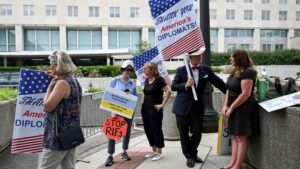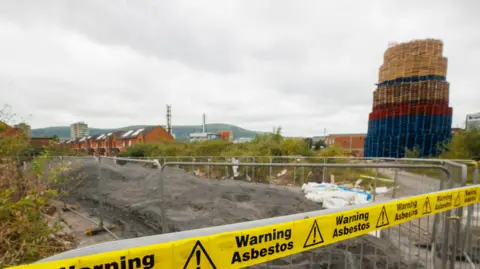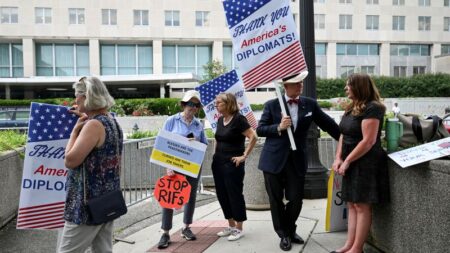In a recent development regarding a contentious bonfire in South Belfast, the Police Service of Northern Ireland (PSNI) has declared it a major incident ahead of the traditional lighting ceremony associated with the Twelfth of July events in Northern Ireland. This annual celebration, which commemorates the Battle of the Boyne where Protestant King William III triumphed over Catholic King James II in 1690, has heightened tensions in the community, particularly due to safety and environmental concerns.
Belfast City Council has taken an active role by requesting police assistance to dismantle the bonfire, primarily due to its dangerously close proximity to a major electricity substation that powers the city’s hospitals, including Belfast City Hospital and the Royal Victoria Hospital. With the bonfire scheduled to be lit imminently, authorities are taking steps to mitigate any risks that might jeopardize public safety or critical infrastructure.
In an effort to ease concerns, bonfire builders have voluntarily removed several pallets from the top of the bonfire. They communicated to BBC News NI that this action was intended as a peace gesture, demonstrating their willingness to consider community concerns amid escalating tensions. The PSNI has stated that they are currently consulting with various agencies and community representatives but have yet to make a firm decision on how to proceed with the potential dismantling operation.
The issue of safety at the bonfire site is compounded by the presence of asbestos, which has raised alarms among local officials. The site, positioned between the Donegall Road and Westlink, has sparked calls for immediate action from the environmental minister to ensure public safety. Emma Little-Pengelly, Deputy First Minister and DUP MLA, emphasized the need for precautions to safeguard the health and wellbeing of residents. Political discourse around the incident has intensified, with figures across the political spectrum urging for prompt action as residents continue to voice their concerns.
Notably, Sinn Féin MLA Pat Sheehan criticized the situation, stating that the police have a responsibility to manage such incidents effectively. He highlights that systematic engagement with the landowner and the Northern Ireland Environment Agency (NIEA) is crucial, especially given the unique circumstances surrounding this particular bonfire.
The residents themselves have expressed deep sentiments about the tradition such bonfires embody. Many have indicated that the bonfire represents a significant cultural event, essential for passing down traditions to future generations. Carol Walsh, a local resident, expressed pride in the continuity of this tradition and the community’s efforts to assemble materials for the bonfire. Likewise, Billy Garrett articulated the frustration felt in the community, describing external pressures to dismantle the bonfire as an attack on cultural expression.
Amidst ongoing discussions, the NIEA has reported its awareness of the asbestos issue, noting that they were first alerted on May 16. They are collaborating with the landowner, Boron Developments, to ensure the removal of the hazardous material. Challenges lie ahead, however, as Boron Developments claims that their chosen waste management company cannot proceed with removal while the bonfire is under construction.
Furthermore, the PSNI is navigating a complex political landscape where its decisions may influence not just local safety but also community relations. With heightened tensions in the area, any enforcement operation risks igniting unrest. Local responses have already included protests and physical blockades around the bonfire site, further complicating the situation for authorities.
To provide context, bonfires such as this one have long been a feature of Eleventh night celebrations, serving to mark the beginning of the parading season associated with the Twelfth of July. Despite the historical significance of these celebrations, their association with a particular political and cultural ideology often leads to complex community dynamics.
As the situation develops, the implications of how safety, environmental concerns, and cultural practices intersect remain at the forefront of public and political discourse in Belfast. Local representatives and community leaders will need to work collaboratively to balance tradition with safety concerns, ensuring that the health and welfare of all those in the vicinity are prioritized without disregarding the community’s cultural heritage.










